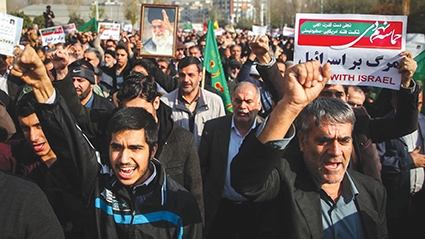Calls for Prisoners to be Freed Following Protests in Iran
It was announced last week that the violent protests that accumulated a total death-toll of 21 had ended. The mass protests had erupted over economic issues in the city of Mashhad on December 28. The unrest spread like wildfire across the whole country, turning against the regime in more than 80 cities.
Over 500 people were arrested in the capital Tehran alone, and local media says that more than 1,000 were detained throughout the country. The average age of those arrested is under 25, Deputy Interior Minister, Hossein Zolfaghari, said.
Over 100 people gathered outside the notorious Evin Prison in Tehran on Sunday, calling for their friends and family to be released. One man insists that his son was arrested by mistake.
“I don’t want trouble. I just want my son released.”
Another man was waiting in the harsh winter conditions outside Evin Prison for his friend Hossein, who was arrested on December 29, to be released. Hossein participated in the protests because “he was angry, like many people,” his friend said.
Hossein saw a man had grabbed the cellphone of a woman who had been filming the protesters and “chased him, but he turned out to be a plainclothes police officer,” Ali said. “I’m bringing the deed of his house, so he can post for bail.”
According to reports from friends and family members outside Evin Prison on Sunday, mere dozens have been released, while hundreds remain.
The country’s declining economic conditions, corruption and a lack of personal freedom have now been brought into the spotlight.
A group of reformist activists wrote a letter, published on the front page of the newspaper Etemaad on Sunday, calling for the release of those protesting. They said that Iranians have a right to protest.
“People feel belittled and hopeless,” the letter said.
A makeshift camp was even setup under one of the prison’s watchtowers on Sunday, where protestors gathered around a campfire, having brought an ample supply of wood and tents in which to sleep.
“The political prisoners must be freed,” they chanted, as people filmed them with their phones, and as guards carrying machine guns on their shoulders looked down from walls and watchtowers above.
Iran is said to be a repressive country where activism often leads to punishment, such as imprisonment or other charges. Hundreds of journalists, bloggers and activists have been detained over recent years. Charges can be imposed on those who are seemingly not doing anything wrong, like Jason Rezaian, a reporter who was held in Evin Prison for 544 days on charges of espionage, a claim he strongly denies.
During Iran’s last big anti-government demonstrations, thousands were arrested, and temporary prisons had to be established because Evin was full. In one, the Kahrizak detention center in Tehran, several protestors were tortured and three even died.
A full investigation of the case was called for by Iran’s supreme leader, Ali Khamenei. Several officers were sentenced to jail time, though not all served the sentence.
Tom Day












